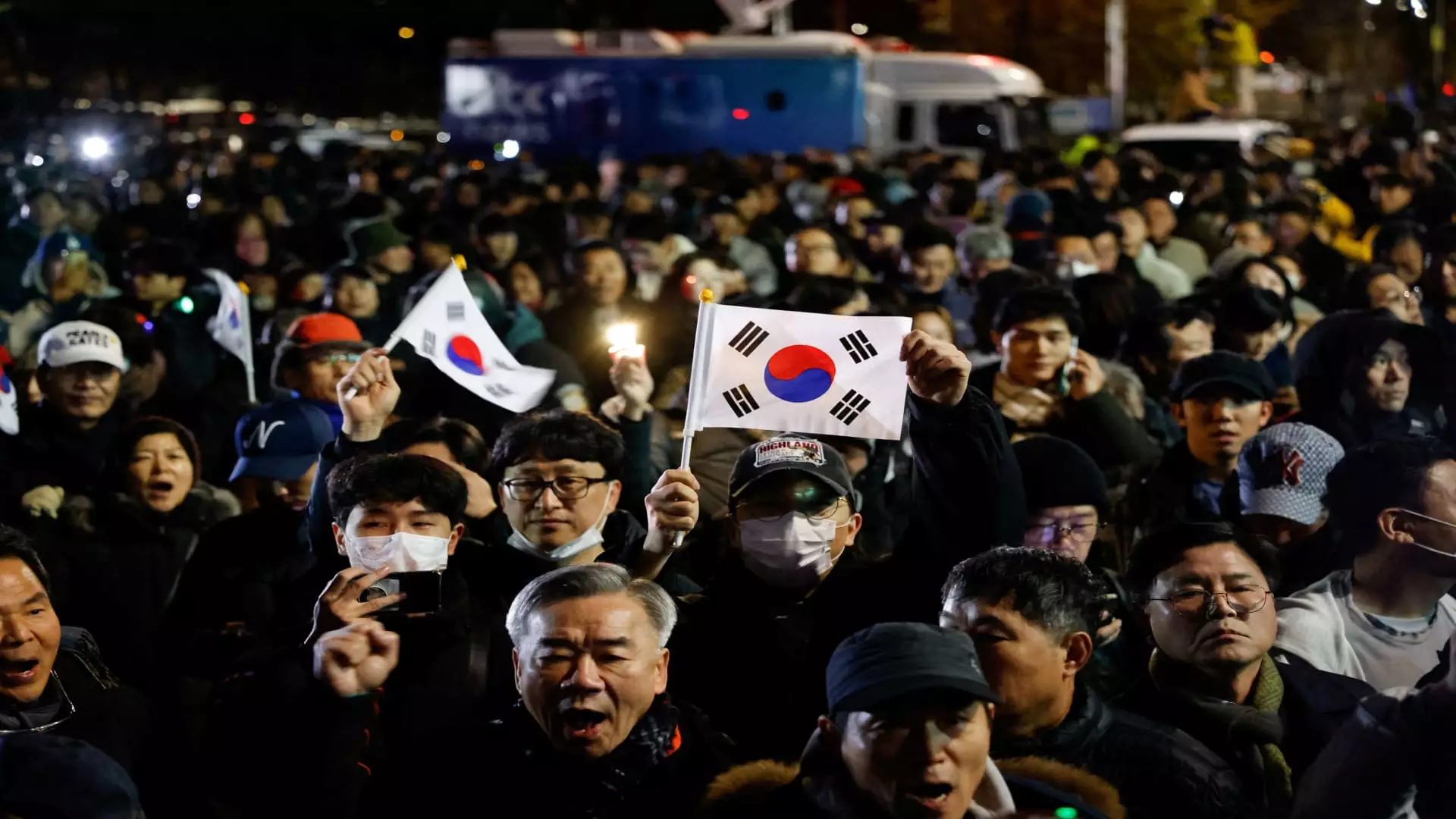In an unprecedented crisis that has gripped South Korean politics, President Yoon Suk Yeol finds himself embroiled in controversy following a failed attempt to impose martial law. This situation has not only led to a political storm but has also resulted in a temporary travel ban placed on the president as he faces an escalating tide of dissent. Reports from the justice ministry have confirmed that Yoon’s attempts to establish martial law were thwarted, igniting calls for his resignation amid deepening concerns about his future in office.
Yoon’s political fate seems precariously balanced on the decisions made by the ruling People Power Party (PPP), which has announced plans to set up a task force to manage the repercussions of his leadership crisis. The overall fallout has prompted a significant inquiry into his actions. Amidst a landscape characterized by political discord, it appears the president may be losing his grip on power, particularly as cracks appear within the military ranks during this critical juncture.
The circumstances leading to this political upheaval stem from Yoon’s controversial declaration on December 3, where he empowered the military with extensive emergency powers, citing efforts to combat “anti-state forces.” However, the subsequent public and political backlash culminated in a strong parliamentary rejection, which forced Yoon to rescind his radical decree just hours later. The acting defense minister and other military officials have since openly refused any future orders to enact similar measures, illustrating a stark divide between the executive and military structures.
Adding to Yoon’s woes, the former defense minister, Kim Yong-hyun, has been arrested as part of an ongoing criminal investigation, raising serious questions about the legality of the martial law initiative. The opposition Democratic Party has escalated their demands, urging for the complete removal of Yoon’s military command and criminal prosecution of those involved in the controversial affair. The term ‘constitutional crisis’ is becoming increasingly appropriate as the situation unfolds.
Public sentiment has been largely negative, with masses taking to the streets to express dissatisfaction with Yoon’s administration. This growing discord has not only raised questions about his capability to lead but also jeopardizes South Korea’s economic stability, a crucial aspect for Asia’s fourth-largest economy. Opposition leader Lee Jae-myung has articulated concerns about the potential long-term damage the political chaos could inflict on an economy already facing numerous external pressures.
Financial market regulators are on high alert, scrambling to formulate action plans aimed at stabilizing South Korea’s economic landscape. Following the martial law debacle, the Korean finance ministry has pledged to deploy contingency measures and enhance liquidity, highlighting the urgency surrounding this crisis. Should financial instability arise from this political calamity, the government will face intensifying scrutiny from citizens and stakeholders alike.
The constitutionality of the power delegation from Yoon to Prime Minister Han Duck-soo has ignited heated discussions among legal scholars and political analysts. While it is legally permissible for the president to delegate authority to the prime minister, the ramifications of such a decision echo issues pertaining to democratic legitimacy and public trust. With the prime minister not being an elected official, the arrangement raises questions about accountability and governance.
Such a delegation of authority amid political strife may not hold up against scrutiny, and the opposition’s proposed impeachment strategy reflects deep-rooted concerns over Yoon’s governance. Amid mounting challenges, the robustness of South Korea’s democratic institutions will be put to the test as they grapple with the unprecedented crisis at hand.
As South Korea navigates its political turmoil, the repercussions extend beyond its borders. This crisis unfolds against a backdrop of evolving geopolitical dynamics, particularly with North Korea aligning itself more closely with Russia. Such developments render stability in South Korea more crucial than ever, particularly in the context of the United States’ presence in the region. The U.S. has reiterated the importance of democratic processes in addressing the current challenges faced by its Korean ally, further emphasizing the international implications of Yoon’s governance failures.
South Korean Foreign Minister Cho Tae-yul’s somber reflections encapsulate the gravity of the situation, portraying a nation at a critical crossroads. The complex web of domestic political instability combined with international security considerations casts a shadow over the future, suggesting that without decisive action, South Korea could face further decline within its political landscape and beyond.
President Yoon’s leadership crisis is a multifaceted dilemma that not only jeopardizes his political future but also threatens to destabilize South Korea’s economy and its standing on the international stage. In a rapidly changing geopolitical environment, the unfolding events warrant close attention as they reveal deeper implications for South Korea’s democratic integrity and governance.


Leave a Reply